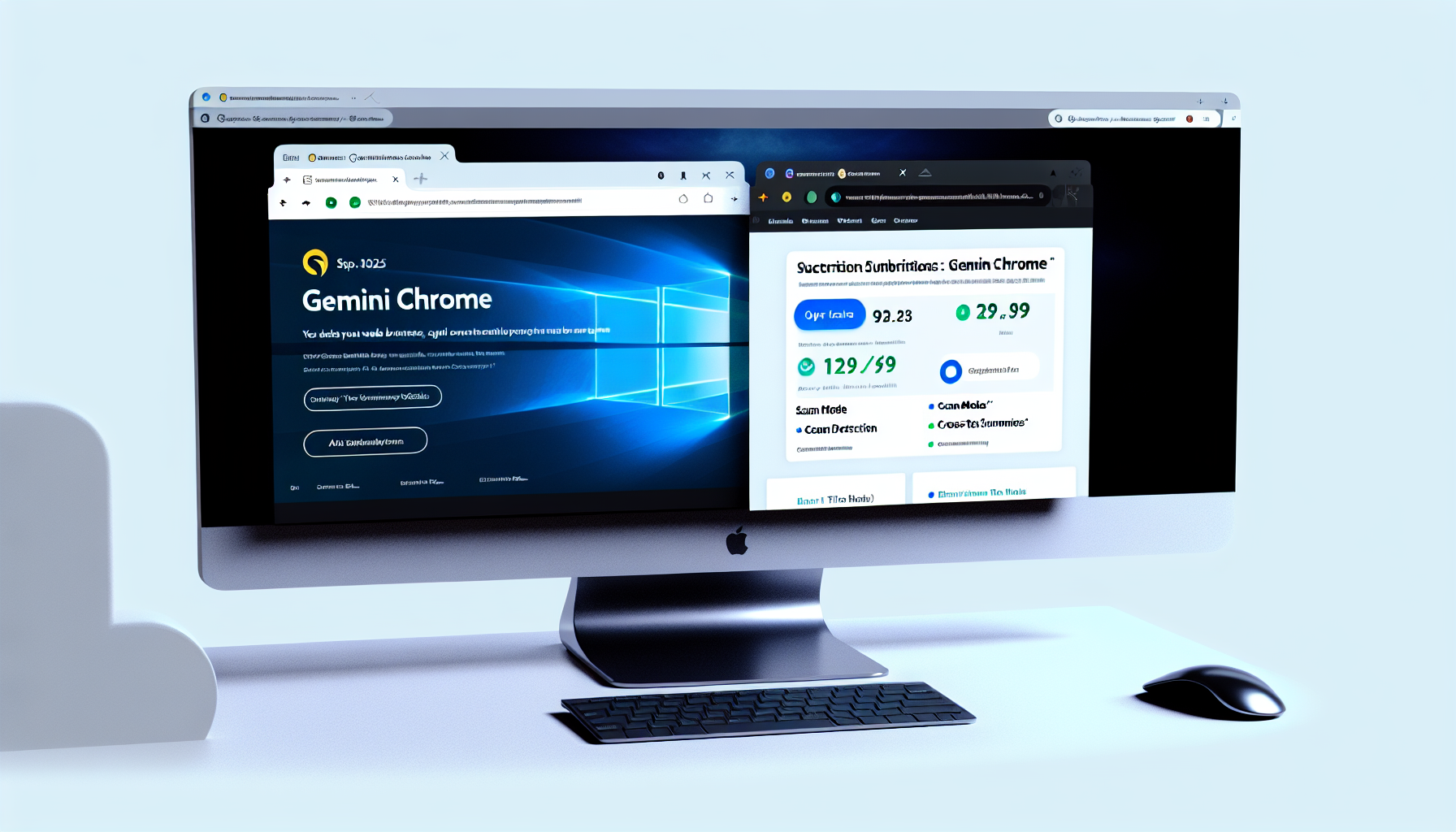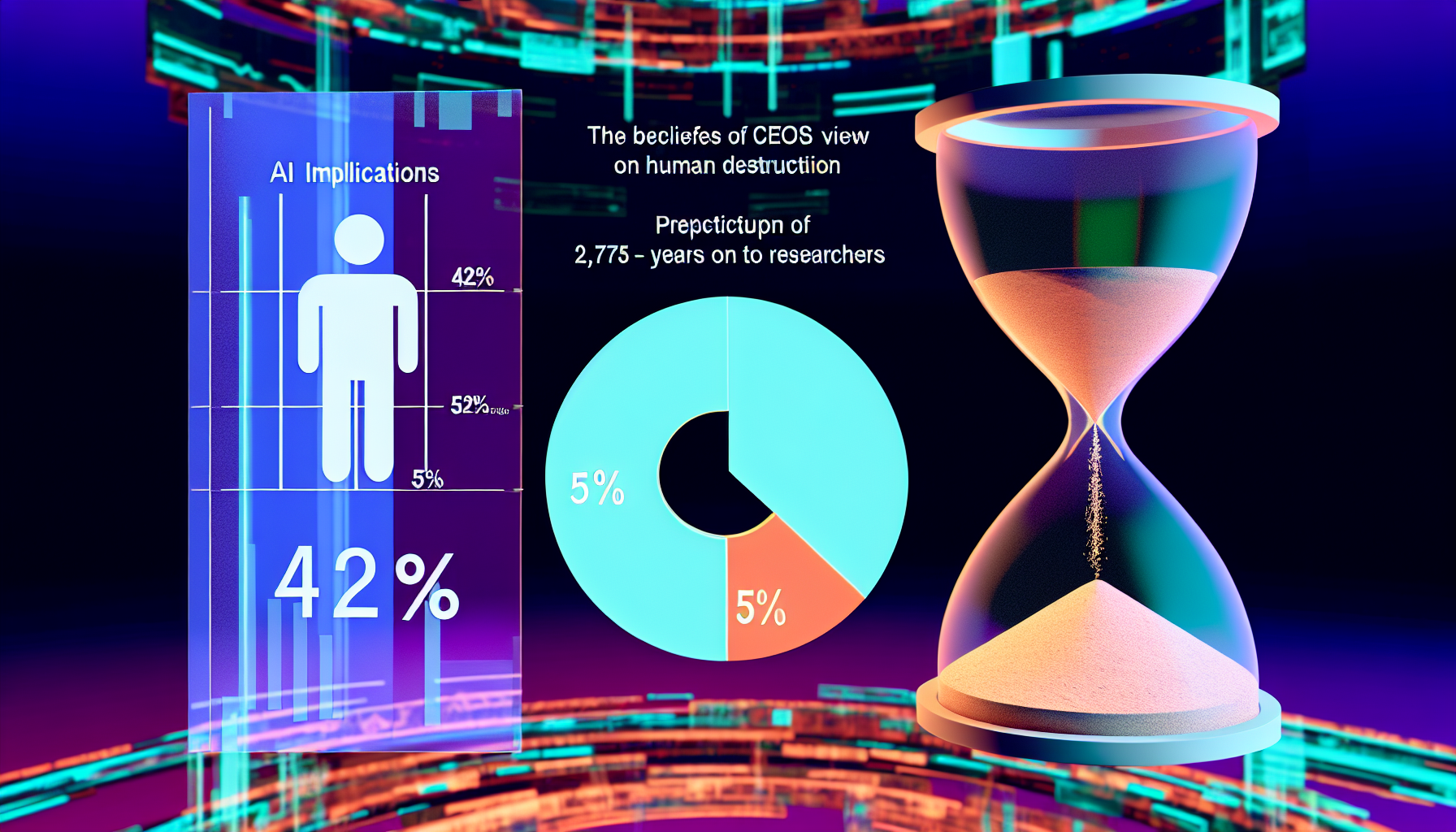Google is pushing AI deeper into everyday browsing with Gemini Chrome, integrating its Gemini assistant into Chrome for all U.S. desktop users on macOS and Windows. The September 18, 2025 expansion follows months of subscriber-only testing and arrives days after a federal judge rejected a breakup, as the company leans on safer, more useful AI to buttress search and browsing. Early capabilities include multi-step automation, webpage summaries, and links into Google apps, with Workspace enterprise access promised within the next few weeks [1].
Key Takeaways
– shows U.S. desktop rollout began Sept. 18, 2025 across two OS—macOS and Windows—days after a court rejected an antitrust breakup. – reveals Gemini Chrome broadened beyond two subscription tiers—Google AI Pro at $19.99/month and AI Ultra—after a May 2025 staged start. – demonstrates four early features: cross-tab summaries, Omnibox AI Mode, one-click password resets, and Gemini Nano scam detection arriving within weeks. – indicates enterprise Workspace access rolling out in weeks, while English-only U.S. coverage spans two platforms and adds more locales later this month. – suggests deeper integration across three Google apps—Calendar, YouTube, Maps—plus a chatbot button and multi-step automation for complex webpages.
Why Gemini Chrome rollout matters now
The rollout crystallizes a strategic shift: Gemini Chrome moves AI assistance from a separate chat tab into the browser where users already read, compare, and search. By situating AI at the point of intent—open tabs and the Omnibox—Google can streamline complex tasks, preserve query visibility, and potentially lift search quality signals, even as answers become more synthesized.
It also stakes a claim in the rapidly mainstreaming category of AI browsers. A persistent chatbot button that can summarize across tabs and pull context is the kind of agentic browsing behavior that was experimental only months ago but is now becoming default for a mass U.S. audience. Industry observers frame this as a pivotal step toward AI-driven browsing reaching mainstream adoption in 2025, with the interface designed to be pinned or unpinned depending on user preference [3].
For Google, the timing—days after a judge rejected an antitrust breakup—underlines urgency. If a breakup is off the table for now, incremental integration is on the agenda. Anchoring Gemini inside Chrome broadens touchpoints without asking users to adopt a new product, consolidating engagement in the browser Google already dominates and reinforcing its AI search posture.
How to use Gemini Chrome features today
At launch, users see a Gemini button in Chrome that can clarify dense webpages, generate summaries, and work across open tabs. The system can compare content side-by-side, extract key points from long articles, and suggest next steps that flow into Google apps where actions can be completed—such as creating events or pulling directions. This context-aware approach is designed to reduce tab juggling during research-heavy tasks.
Several protective and convenience features are tied to the early release. Gemini Nano, Google’s lightweight on-device model, powers scam detection warnings that flag suspicious patterns. Security-minded users also get one-click password resets on compromised accounts. And AI Mode in the Omnibox (address bar) is slated to arrive later this month, turning the bar into an assistant that drafts, clarifies, and transforms text with page awareness. Expansion to more countries and languages is planned this month as well [2].
Under the hood, the experience blends retrieval, summarization, and action invocation. The assistant can jump into context from tabs, then hand off to an app: add a calendar entry from a concert page, queue a tutorial video, or map out a route, giving users continuity from “question” to “completion” inside the same browsing session.
Timeline from subscriber trials to U.S. desktop launch
The path to broad availability started in May 2025, when Gemini in Chrome debuted for paying subscribers—Google AI Pro, priced at $19.99 per month, and AI Ultra with early access—focused on page clarification and cross-tab work. Google outlined future agentic navigation even then, signaling a roadmap from assistive summaries toward goal-completing agents that take action on users’ behalf [4].
On September 18, 2025, access widened from subscribers to all U.S. English-language users on macOS and Windows desktops. Google indicated iOS and mobile availability will follow, and Workspace enterprise users will see their rollout in the coming weeks, extending Gemini’s footprint from consumers to businesses with managed environments [1].
Privacy, safety, and antitrust context
Google is foregrounding safety in this release. By default, features like scam detection aim to reduce harm before it happens, and the company’s staged approach—desktop-first, English-first—keeps initial scope manageable while telemetry and safeguards mature. Promised enterprise controls suggest admins will be able to gate features consistent with organizational policies once Workspace distribution begins.
The antitrust backdrop adds texture. Rather than separating products, Google is knitting them together—responsibly, by its account—to maintain utility and defend share. Embedding Gemini into Chrome effectively converts the browser into an AI surface that complements search, potentially mitigating risk that users drift to third-party AI browsers that intercept queries and ad signals. This is a defensive move wrapped in a convenience play.
Impact on search behavior and the web economy
Gemini Chrome could shift how and when people search. If AI Mode in the Omnibox helps users compose better queries or fulfill intent without switching tabs, it may concentrate high-quality search sessions while offloading routine research to summaries. Publishers could see more “answer on page” behaviors, raising the bar for content that attracts clicks—think original data, interactive tools, and niche expertise that AI summaries cannot fully compress.
Advertisers should watch how AI summaries and agentic flows influence ad exposure and conversions. If users move from “summarize” to “act” within the same Chrome flow—resetting a password or scheduling an appointment—demand may consolidate around fewer, deeper interactions. That could benefit top-of-funnel creative that feeds the assistant and bottom-of-funnel pages that enable quick completion.
How to access, manage, or disable the interface
For U.S. desktop users, Gemini appears as a small icon toward the top-right of Chrome. Clicking opens the assistant pane, where users can request a summary, ask clarifying questions, or run a comparison across currently open tabs. The interface hooks into Google apps—Calendar, YouTube, and Maps—for downstream actions, and an “AI Mode” in the address bar is scheduled to roll out later this month. Users who prefer a minimalist canvas can unpin the interface to reduce on-screen presence [5].
Managing the experience should feel familiar. As features reach Workspace, admins can set policies to control availability. For individuals, the primary toggles will revolve around enabling AI Mode when it arrives, choosing when to surface summaries, and reviewing privacy settings that govern what context Gemini can use to assist within Chrome.
What’s next for Gemini Chrome beyond desktops
Agentic browsing is on the roadmap, indicating Gemini will move from summarizing and suggesting to increasingly completing multi-step tasks—navigating through forms, updating settings, and orchestrating app handoffs. This could collapse the path from intent to outcome, particularly for repetitive tasks like account recovery or trip planning, where the assistant already offers one-click steps.
Mobile and language expansion are close behind. With U.S. desktop as a foundation, Google has signaled more countries and languages are imminent, and iOS and Android availability will extend the experience across a majority of daily browsing sessions. As capabilities mature, expect tighter coupling between Gemini Chrome and Google’s core search results, with AI Mode playing a larger role in how queries are refined or fulfilled.
Strategic outlook: consolidation over fragmentation
The browser remains the web’s primary gateway. By folding Gemini into Chrome, Google increases the likelihood that AI-enhanced sessions stay inside its properties—from the Omnibox to apps like Maps and YouTube. This consolidation strategy prioritizes continuity: read, summarize, decide, and act without context loss. For users, the near-term payoff is time savings on dense pages and routine fixes. For Google, it is sustained relevance as AI becomes the layer through which the web is read and acted upon.
Ultimately, the success of Gemini Chrome will hinge on quality. Summaries must be accurate, automation must be trusted, and handoffs must be seamless. If the assistant can consistently compress multi-tab chores into a few guided steps—without overstepping on privacy or publisher value—the September 2025 milestone will look like the moment AI browsing stopped being a sidecar and became the steering wheel.
Sources:
[1] Reuters – Google adds Gemini to Chrome browser after avoiding antitrust breakup: www.reuters.com/sustainability/boards-policy-regulation/google-adds-gemini-chrome-browser-after-avoiding-antitrust-breakup-2025-09-18/” target=”_blank” rel=”nofollow noopener noreferrer”>https://www.reuters.com/sustainability/boards-policy-regulation/google-adds-gemini-chrome-browser-after-avoiding-antitrust-breakup-2025-09-18/
[2] TechCrunch – Google brings Gemini in Chrome to US users, unveils agentic browsing capabilities, and more: https://techcrunch.com/2025/09/18/google-brings-gemini-in-chrome-to-us-users-unveils-agentic-browsing-capabilities-and-more/ [3] Wired – Google Injects Gemini Into Chrome as AI Browsers Go Mainstream: www.wired.com/story/google-gemini-ai-chrome-browser” target=”_blank” rel=”nofollow noopener noreferrer”>https://www.wired.com/story/google-gemini-ai-chrome-browser
[4] Google (The Keyword / Gemini blog) – Gemini App: 7 updates from Google I/O 2025: https://blog.google/products/gemini/gemini-app-updates-io-2025/ [5] MacRumors – Google Adds Gemini AI to Chrome: www.macrumors.com/2025/09/18/google-adds-gemini-ai-to-chrome/” target=”_blank” rel=”nofollow noopener noreferrer”>https://www.macrumors.com/2025/09/18/google-adds-gemini-ai-to-chrome/
Image generated by DALL-E 3











Leave a Reply